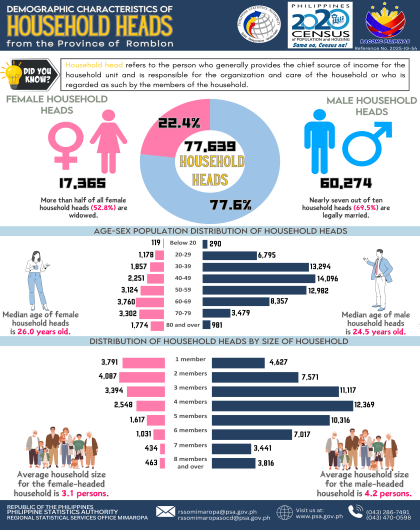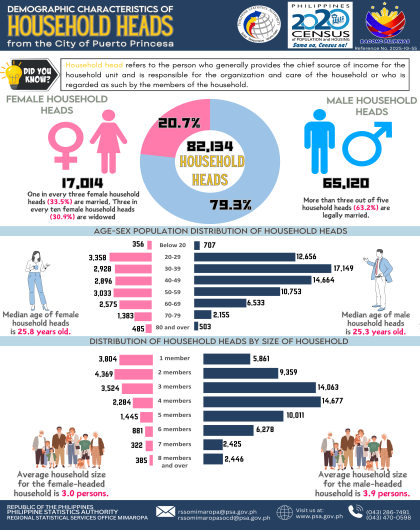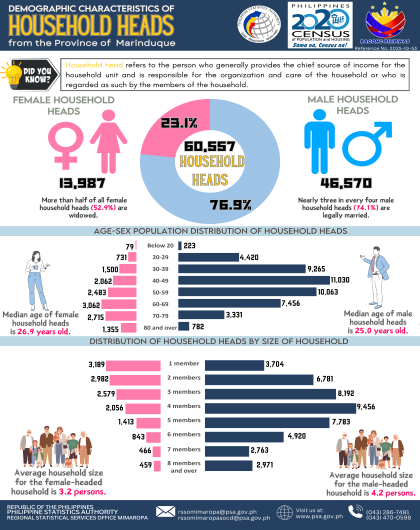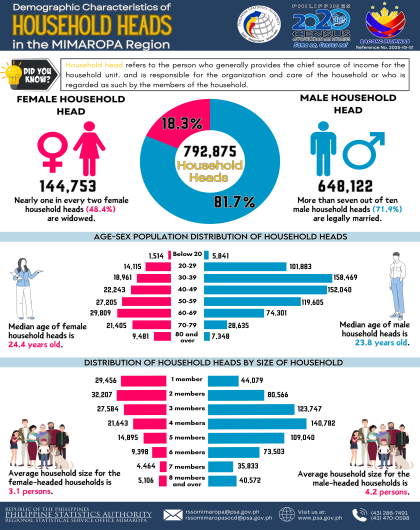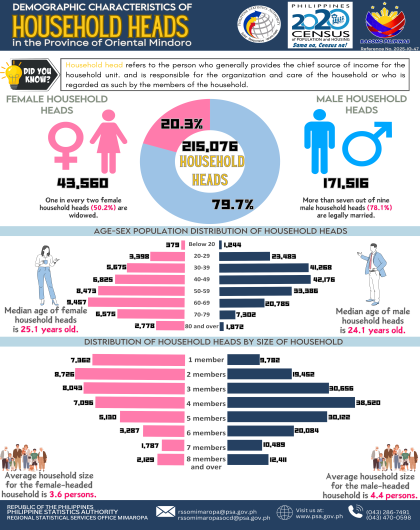SPECIAL RELEASE
Religious Affiliation in Naujan, Oriental Mindoro
(2020 Census of Population and Housing)
Roman Catholics account for 86.3 percent of the household population
Of the 109,492 household population in 2020, 94,505 persons (86.3 percent) reported Roman Catholic as their religious affiliation. It was followed by Iglesia Ni Cristo with 5,243 persons or 4.8 percent, and United Church of Christ in the Philippines with 1,518 or 1.4 percent. Completing the top ten religious affiliations in 2020 in the municipality of Naujan, Oriental Mindoro was Jesus is Lord Church with 0.7 percent, Other Protestant and Christian Missions in the Philippines with 0.5 percent, each, Seventh Day Adventist with 0.4 percent, Church of Christ, Bible Baptist Church and Pentecostal Church of God Asia Mission with 0.3 percent each.
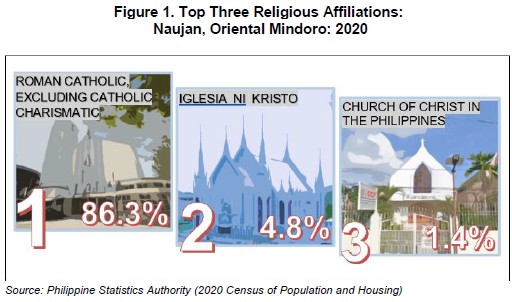
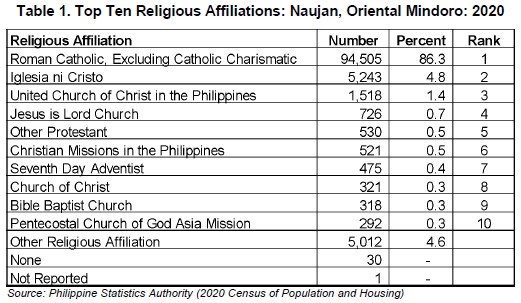
Barangay Paitan has the highest proportion of household population with Roman Catholic as religion
Of the 70 Barangays in the municipality of Naujan, Oriental Mindoro, Barangay Paitan posted the highest proportion of Roman Catholics comprising 99.6 percent of the household population. By completing the top ten barangays, it was followed by Barangay San Agustin I with 97.9 percent, Barangay Santa Cruz with 97.5, Barangay Malaya with 97.3, Barangay Laguna and Barangay Concepcion with 96.9 percent each, Barangay San Isidro with 96.8 percent, Barangay Bayani with 96.4 percent, Barangay Malinao with 96.2 percent and Barangay Bacungan with 96.0 percent. Meanwhile, Barangay Masaguing recorded the least number of household population with Roman Catholic as religion with 100 or 21.2 percent. (Table 2 and Table 3)
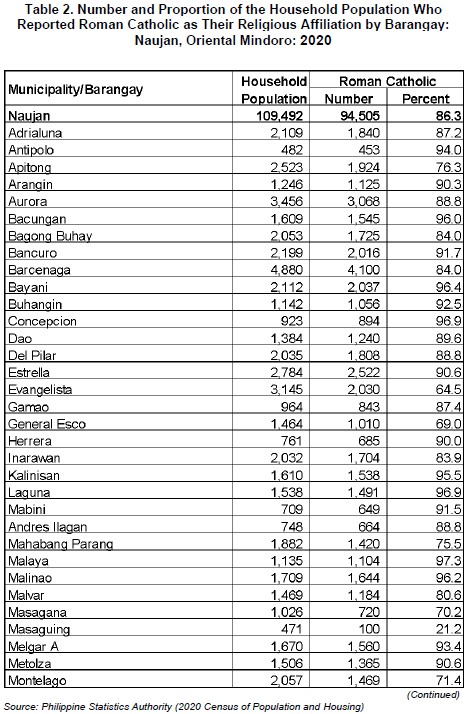
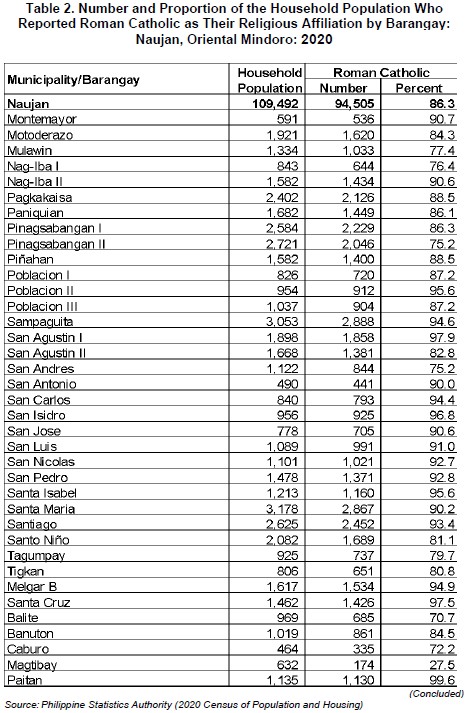
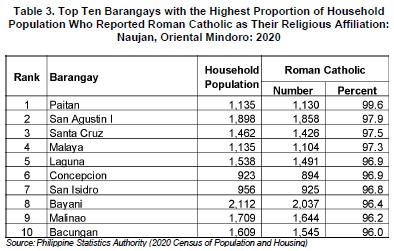
Barangays with at least 90.0 percent of the household population who reported Roman Catholic as their religion
Among the 70 barangays in the municipality of Naujan Oriental Mindoro, there were 34 barangays with at least 90.0 percent of household population reported Roman Catholic as their religious affiliation. These barangays were Barangay Paitan with 99.6 percent, Barangay San Agustin I with 97.9 percent, Barangay Santa Cruz with 97.5 percent, Barangay Malaya with 97.3 percent, Barangay Laguna and Barangay Concepcion with 96.9 percent each, Barangay San Isidro with 96.8 percent, Barangay Bayani with 96.4, Barangay Malinao with 96.2 percent, Barangay Bacungan with 96.0 percent, Barangay Santa Isabel and Poblacion II with 95.6 percent each, Barangay Kalinisan with 95.5 percent, Barangay Melgar B with 94.9 percent, Barangay Sampaguita with 94.6 percent, Barangay San Carlos with 94.4 percent, Barangay Antipolo with 94.0 percent, Barangay Melgar A and Santiago with 93.4 percent each, Barangay San Pedro with 92.8 percent, Barangay Nicolas with 92.7 percent, Barangay Buhangin with 92.5 percent, Barangay Bancuro with 91.7 percent, Barangay Mabini with 91.5 percent, Barangay San Luis with 91.0 percent, Barangay Montemayor with 90.7 percent, Barangay Nag-Iba II, Metolza, San Jose and Estrella with 90.6 percent, each, Barangay Arangin with 90.3 percent, Barangay Santa Maria with 90.2 percent and Barangay Herrera and San Antonio with 90.0 percent, each.
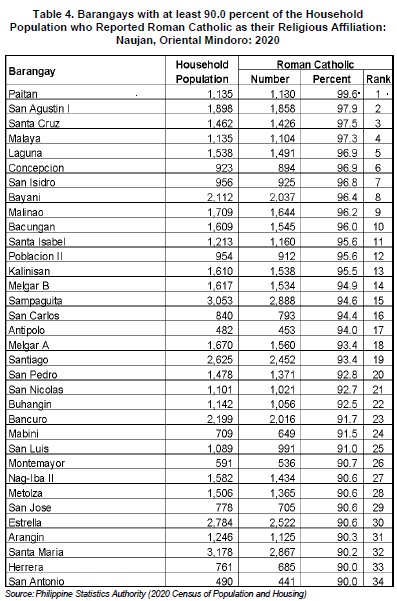
Barangay Masaguing has the highest proportion of the household population with Iglesia ni Cristo as religion
Among the 70 barangays in the municipality of Naujan, Oriental Mindoro, Barangay Masaguing posted the highest proportion of Iglesia ni Cristo with 78.8 percent as their religion. By completing the top ten in order it was followed by Barangay Montelago with 24.1 percent, Barangay Mulawin with 18.3 percent, Barangay Nag-Iba I with 17.9 percent, Barangay, Tigkan with 17.7 percent, Barangay Pinagsabangan II with 16.5 percent, Barangay Motoderazo with 11.4 percent, Barangay Gamao with 11.3 percent, Barangay Pinagsabangan I with 10.7 percent and Barangay Inarawan with 9.9 percent. Meanwhile, Barangay San Carlos and Barangay Antipolo with 0.2 percent each have the least proportion of household population with Iglesia ni Cristo as their religion. (Table 5)
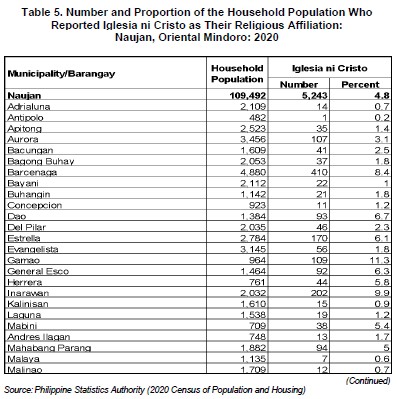
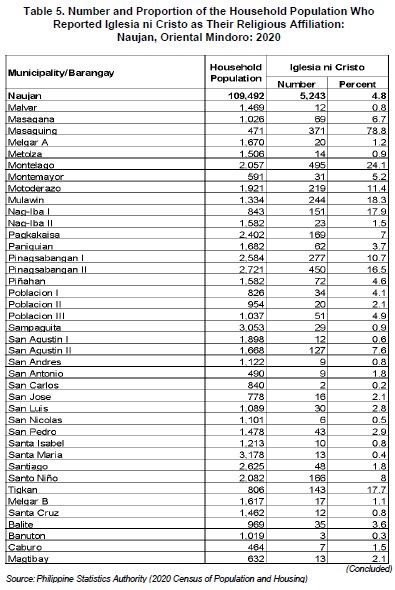
Barangays with Double-Digit Proportion of Household Population Who Reported Iglesia ni Cristo as Their Religious Affiliation
Among the 70 barangays in the municipality of Naujan, Oriental Mindoro there were nine barangays with double-digit proportion of households population who reported Iglesia ni Cristo as their religious affiliation. These barangays were Barangay Masaguing with 78.8 percent, Barangay Montelago with 24.1 percent, Barangay Mulawin with 18.3 percent, Barangay Nag-Iba I with 17.9 percent, Barangay Tigkan with 17.7 percent, Barangay Pinagsabangan II with 16.5 percent, Barangay Motoderazo with 11.4 percent, Barangay Gamao with 11.3 percent, and Barangay Pinagsabangan I with 10.7 percent.

(SGD) CHARLYN ROMERO-CANTOS, PhD
(Chief Administrative Officer)
Officer-in-Charge
Oriental Mindoro Provincial Statistical Office
JAMF
TECHNICAL NOTES
Religious Affiliation in the Philippines
(2020 Census of Population and Housing)
The population and housing censuses in the Philippines are conducted on a “de jure” basis, that is, a person is counted in the usual place of residence or the place where the person usually resides. The enumeration of the population and collection of pertinent data in the 2020 CPH referred to all living persons as of 01 May 2020.
For the 2020 CPH, data on the Religious Affiliation of all household members were collected by asking the respondents, “What is ____’s religious affiliation?”.
DEFINITION OF TERMS


